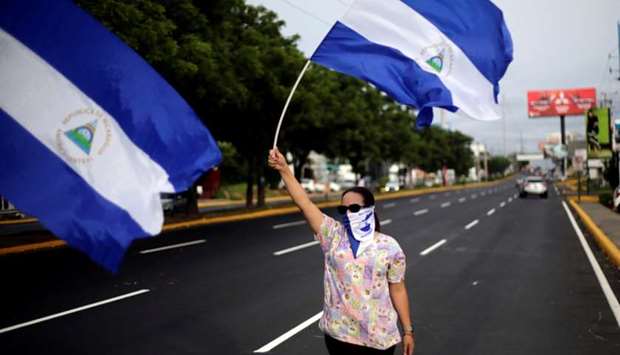Guardian News and Media Managua Nicaragua’s Daniel Ortega will not stand down as president despite more than two months of unrest and violent repression, one his closest advisers has said, accusing opposition activists of trying to engineer a “soft coup”.
Paul Oquist, the minister for national policies, told the Guardian Ortega would not rule out an early election if there was an end to the violence in which about 309 people have been killed. An early poll is a central demand of Ortega’s opponents, but they point out the vast majority of the deaths have been caused by government security forces or their paramilitary allies. This week, the Inter-American Commission on Human Rights (IACHR) sent an investigative team to Nicaragua, the members of which included Guatemala’s former attorney general Claudia Paz y Paz and Sofia Macher, a former head of Peru’s truth and reconciliation commission.
In an interview in London, Oquist said the protesters had no coherent programme and included people who were committed to destabilising the country. “There are peaceful demonstrators to be sure, but there is a pro-coup movement trying to destabilise the country using organised looting parties, fake news and quite depraved killings,” he said. Ortega, a former revolutionary leader, was elected in 2006, but has been accused of increasingly autocratic rule as he and his wife, Rosario Murillo, who is also the vice-president, have tightened their control of state institutions. His opponents have warned Nicaragua risks open conflict if the ruling couple do not stand down, but Oquist said: “If we are going to have governments changed according to whichever side has more barricades on the streets, we will never get out of the violence.
” Peace talks mediated by the Catholic church have so far made little progress, which Oquist attributed to the fact that the meetings have been televised and included as many as 30 opposition representatives at a time. “If the violence stops, and the barricades strangling the economy are lifted, President Ortega’s position is that there is nothing that cannot be put on the table, including when elections are held,” he said.
Oquist also suggested neighbouring countries of the Central American Integration System could help mediate, claiming a statement at the weekend calling for dialogue and an end to the violence constituted “a turning point in the entire process”. “They have a credibility to look for an agreement that sticks. This is the beginning of a solution. It means the Central American presidents have come on the scene big time to support this process,” he said. Ortega’s opponents suspect his enthusiasm for external involvement is a ploy to buy time and drain energy from protesters.
Regional leaders have also expressed concern that demonstrators’ roadblocks are damaging not only Nicaragua’s economy, but the mobility of transport across the region. Oquist acknowledged the social security changes that caused the revolt were a mistake, but said they were recommended by the International Monetary Fund and had been withdrawn within four days of protests starting.
An election is due in 2021, but one of the opposition’s key demands is that it be brought forward to 2019, even if some quietly fear this will not give them enough time to find a candidate after years of Sandinista domination. Oquist said Ortega was willing to discuss the timetable, but “if the violence does not cease, it would be crazy to go into an electoral process. You would have massacres in every municipality as electoral forces clash”. “The longer this takes to resolve, the worse it is going to be. Nicaragua was seen the most secure country in central America and drawing private investment as a result,” he said. “We were the one country that had blocked the drugs cartels. All that has been blown out of the water. It will take years and years to recover.”

A demonstrator waves a Nicaraguan national flag during a protest against President Daniel Ortega's government in Managua, Nicaragua
